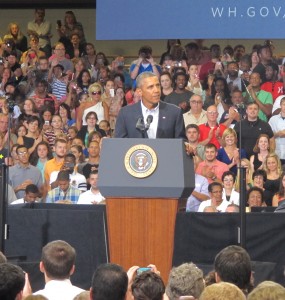Supreme Court takes up challenge to Obama administration’s carbon limits
-
Katie Colaneri

Katie Colaneri/StateImpact Pennsylvania
President Obama speaks at Lackawanna College in Scranton, Pa.
The Supreme Court has agreed to take on a major environmental challenge in the first day of its term. The justices will consider a case against the Environmental Protection Agency’s carbon limits, the Obama administration’s first major proposal to address climate change by cutting greenhouse gas emissions from power plants.
SCOTUSblog reports the court accepted six of nine petitions, including challenges from the American Chemistry Council and the U.S. Chamber of Commerce, and will focus on one question: does the EPA have the right to limit emissions from stationary sources like power plants just as it did for cars and trucks under the Clean Air Act?
Pennsylvania is not part of the challenge, but state Department of Environmental Protection Secretary Chris Abruzzo has sent a letter to the EPA in support of other states that argue the federal agency has overstepped its bounds and that limiting emissions should be left to the states.
Reuters reports the challenge could define the boundaries of the Clean Air Act.
More from Reuters:
By agreeing to hear various legal claims raised by states and business groups, the court could be setting the stage for limiting the reach of its 2007 ruling, Massachusetts v. EPA, in which it held on a 5-4 vote that carbon was a pollutant that could potentially be regulated under the Clean Air Act.
The legal question, which the court crafted itself from those raised in the six petitions, indicates the court does not plan to revisit the underlying reasoning behind Massachusetts v. EPA but will weigh whether EPA went further than allowed under the Clean Air Act.
Although the court will not rule until next year, the agreement to entertain the petitions is a setback for the administration. Oral arguments are likely to be heard in early 2014 with a ruling issued by the end of June.
Some Pennsylvania lawmakers and coal-boosters have argued the EPA’s proposed rules will amount to a “de facto ban” on coal-fired power.
Most natural gas-fired plants are expected to easily meet the new standards, but all new coal plants would need to use something called “carbon capture and sequestration technology” or CCS to bury most of their carbon emissions underground. The coal industry and some environmentalists argue that technology is still in development and not commercially available. Other environmentalists and the EPA say it could force the development of better technology to cut air pollution.
















